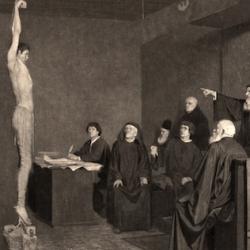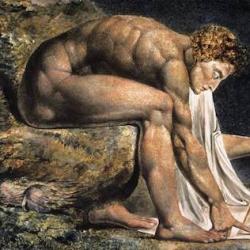It’s hard to pick up a magazine today without finding an article defending Darwin or Darwinism. Many of them are designed to prove that Darwin was not an opponent of religion, and that religion and science can live happily ever after, so long as the wicked stepmothers at the Discovery Institute are kept out of the picture.
One of the most interesting and informative of these recent pieces is Gertrude Himmelfarb’s (in TNR, December 12). Among many interesting points, Himmelfarb describes the influence of Thomas Malthus on Darwin and the development of his theory:
“Half a dozen years [before writing the Origin], [Darwin] had picked up – almost by change and ‘for amusement, he later said – the book that inspired his theory, Malthus’s Essay on the Principle of Population . (Perhaps only Darwin would have thought to read it for amusement.) Malthus suggested to him the mechanism by which higher species emerged from lower ones. Just as the Malthusian struggle for existence, caused by the discrepancy between the means of subsistence that increased only arithmetically and the population that increased geometrically, led to the survival of the fittest in human society, so in animal and plant life, Darwin reasoned, a similar struggle led to the preservation of favorable variations and thus the formation of new species.” Though Malthus’ influence is widely recognized, Himmelfarb notes the “rarely observed oddity” that in turning Malthus’ theory into a theory of evolution, Darwin was turning Malthus inside out: “However much breeders might try to cultivate specific desirable traits, [Malthus] pointed out, they soon reached a limit, so that the species itself remained fixed. And so it was in man. Indeed, Malthus’s purpose in writing his essay was to confute the theories of perfectability current at the time. The struggle for existence in man, he regretfully concluded, led not to a better or happier mankind but to a mankind doomed to a life of misery and vice.”
Himmelfarb also points out that Darwin saw his own work not as proving the mindless rule of chance, but as a reconciliation of morphology and teleology. In his Autobiography , Darwin stated, “I deserve to be called a Theist,” and Himmelfarb suggests that “he may have recalled an exchange he had had two years earlier with Asa Gray, the American botanist and evolutionist, who had congratulated him for restoring teleology to natural science, ‘so that instead of Morphology versus Teleology, we shall have Morphology wedding to Teleology.’ ‘What you say about Teleology,’ Darwin replied, pleases me especially, and I do not think any one else has ever noticed the point.”
T.H. Huxley had made the same claim, challenging the Ernst Haeckel’s “causal or mechanical” interpretation of the Origin. Huxley argued that “Darwin’s great service to biology was ‘the reconciliation of Teleology and Morphology,’ the ‘mutual interaction’ of both within the ‘wider Teleology’ that was the ‘most fundamental proposition of Evolution.’” Huxley appealed to William Paley (!), the “acute champion of Teleology” who, he said, “proleptically accepted the modern doctrine of Evolution.” Darwin’s teleology was hardly benign: Wonderful forms evolve from simpler ones, but man arises “from the war of nature, from famine and death.”















